KATHMANDU, Aug 27: The ‘NADA Auto Show 2019’ is all set to kick off at Bhrikuti Mandap in Kathmandu from Tuesday. The annual mega auto show of the country hosted by the NADA Automobiles Association of Nepal will feature 95 stalls related to four-wheeler, two-wheeler, lubricants, spare parts, batteries, banks and insurance companies. The auto show will continue till September 1 Nepal Republic Media hosted a roundtable meeting with business leaders of auto sector on the eve of the NADA Auto Show 2019 to discuss about the challenges, prospect and other issues related to transportation sector.
Excerpts:
Assembling needs to be encouraged
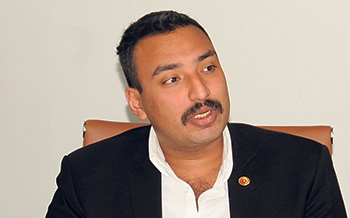
Karan Chaudhary,Executive Commitee Member, NADA
The assembling of automobiles is done at different levels. The vehicle sales have not been enough for the CKD-level assembling. SKD-assembling is in the first level. However, for that we need tax and other subsidies, incentives, and encouragement from the government. The government should promote items that are made in Nepal. For all these, the government should think and act in a way to promote local production.
30% lubricants are produced in Nepal
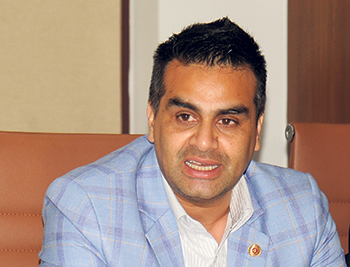
Surendra Kumar Upreti Treasurer, NADA
Lately, the market of lubricants is increasing in Nepal. The market of lubricants is 30,000 kiloliters, and transaction worth Rs 10 billion is taking place takes place in the country. Only 30% lubricant demand is fulfilled by the Nepali market and remaining 70% is imported. While we say import of lubricants should be replaced, the culture of importing is flourishing. People have easy access to lubricants but they are unaware of its negative impact. It could also result in serious accidents.
The consumption of lubricants in Nepal depends on the condition of roads. Most of Nepali traders purchase lubricants from India, China and third countries. There is no guarantee that the lubricants imported after paying customs are of good quality. The government should apply different measures to check quality of imported lubricants. Tests should be done using scientific methods. We should be careful if the imported lubricants have ISO certification. Not only good quality lubricants but we should import good quality spares parts as well. We should be careful about the import of lubricants, break oil, etc. The registration process of an industry is a big hassle. It should be registered in 10-12 offices so, the government should manage an environment to make the process easy. There are no infrastructure and electricity, nor is there any easy environment for factories because of which lubricant industries have not been able to compete at international levels. About 25% of lubricants market is based on illegal import. We are having trouble to compete with dealers who import illegally. If the government imposes 5% customs charge on lubricants, 99% of illegal imports will be controlled.
Determining tax rate is important
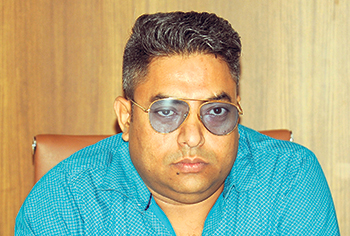
Prakash Kapuri, Vice President, NADA
The responsibility of economic development falls on the government. There are complications in banking and tax administration. The automobile sector generates more revenue for the government than other sectors. To make proper policies for this sector, the government should consult with concerned entrepreneurs and other stakeholders.
The policies should not be made looking at the registration of erstwhile Bagmati zone alone. Tax rate determination is very important. The government should consider the entire country. Vehicles have not reached in the remote districts. About 50% of the total vehicles are in Province 3 alone.
Nepal has entered the agenda of economic development
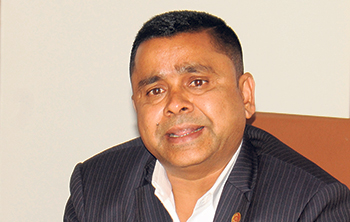
Krishna Prasad Dulal, Acting President, NADA
The five-day auto show will be centered to a package of trade promotion to road safety. With the import of 3.53 million vehicles in the country as of March 14, this year, we have felt that 1% of Nepal’s population has access to vehicles. Though the country has entered the agenda of economic development and all political parties have economic development as their main objective, there has been no collaboration with the private sector.
There has been no solid achievement even if the government has stated to play a role to ease the process. As the country has not gained momentum in development, there is no space to do work in favor of the country.
There is a need to find out where and why development was halted. Road is important for transport. Development cannot be imagined without roads. Roads that were started 20 years ago have not been completed yet. The government allocates billions of rupees for road, but the budget freezes because of its underutilization. It is necessary for all of us to know why the budget is underutilized. The construction of new Ring Road in the Kathmandu Valley was supposed to be completed by now, but still the work of old Ring Road is not completed.
Private sector on warpath against govt over implementation of V...

It is a sad thing that there has been no solid decision regarding what model to be followed to build the road. There is no environment for retaining youth in Nepal and providing them with work according to their capability. It is certain that youth’s attraction towards foreign employment will be decreased if they can earn Rs 40,000 to Rs 50,000 in Nepal.
Tire producers discouraged by policies
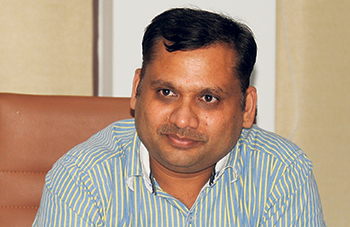
Vikram Singhania, Joint Treasurer, NADA
The annual tire market of Nepal is worth about Rs 8 billion. Tires are imported from India and other countries. Private sector has taken some initiative for tire production. Some tube industries also have also been opened. However, they are not enough.
It has been 22 years since the Gorakhkali Rubber Industry was established. The industry remains closed for the last six years. Quality tires were being produced in the country before the factory was closed. People used to like Gorakhkali tires. However, the factory closed because of wrong policies.
It is important to analyze why Nepali producers are not producing tires. Raw materials are not available to produce tires in Nepal. Tire industry is directly related to the petroleum. We need crude oil and rubber to produce tire. If government gives priority to rubber tree plants, this will be important for the industry. Rubber can also be exported from the country.
Similarly, 20% customs duty has to be paid from this year while importing raw materials. Till last year 15% custom duty had to be paid.
The government on the one hand talks about infrastructure development, and on the other, it increases customs duty of raw materials. Increase in customs duty increases the cost of the product.
NADA will face space problems a few years from now

Nirakar Shrestha, Coordinator, NADA Auto Show 2019
The NADA Auto Show 2019 that is taking place from August 27 is the 14th edition of the mega event. The number of exhibitors has increased this year. Last year, the number of exhibitors was 71 and this year it has reached 95. Of them, 23 are four-wheeler companies, 19 are two-wheelers, 12 lubricants, 9 tires, 5 batteries, and 14 spare parts, garage equipment accessories companies. Likewise, 13 banking and insurance companies will participate in the auto show. We have been able to add 14 exhibitors as the area for the exhibition has been expanded considering last year’s space problem. We have been able to involve banks and insurance companies this year as the space in the garden section will be used during the show. We have estimated increase in the number of visitors in comparison to last year. There were 65,000 visitors last year and this year the number is expected to rise. We are expecting 75,000 visitors this year. We are strengthening the auto show in terms of quality and quantity by using available resources. Maximum use of necessary capacity has been used to make the auto show grand. It is sure that NADA will face space problem in few years from now. We have been drawing concerned bodies’ attention from time to time and words about the construction of international exhibition site is going around but no steps have been taken because of which we are worried.
The main challenge this year is parking management. Though there is parking facility for 125 vehicles and 150 motorcycles this year, considering there will be a crowd of 20,000 to 25,000 visitors in main days, there will be problem in parking.
Long-term policy needed

Deepak Agrawal, Executive Committee Member, NADA
We need long-term policy in the auto sector. It becomes problematic when the government changes its policy every year. The government should prepare a long-term plan after getting suggestions from stakeholders. Issue about auto assembling is surfacing and plants of two-wheeler are being established.
We are also establishing CKD’s two-wheeler plant in few months with an investment of Rs 1 million. We are confused at the moment. There is a culture of encouraging in the beginning and later discouraging. Two-wheeler has become a necessity like food, clothes and shelter.
The government has categorized taxes of 100%, 250%, and 250%. It is customary to impose more tax on vehicles of power higher than 1,600 CC, but taxes on vehicles that are a necessity for our difficult geographical terrain doesn’t make sense. We are compelled to visit several places to register a business. How many doors should we knock at to open an organization? The government talks about one-door policy but it is not reflected in action. An environment to operate business should be created. Only lip service does not help.
The government talks about international level financial management but the implementation part is weak. There is no infrastructure either. An appropriate policy should be prepared. We have envisioned to shift from euro 4 to euro 5 and 6 but have not worked on infrastructure. There is no machine to check pollution. Though the policy is made by taking reference from India and China, it is not prepared yet.
Tired of govt indifference
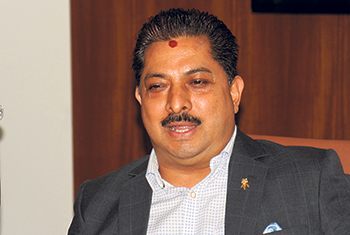
Anjan Shrestha, Immediate Past President, NADA
As government has imposed high customs duty, the price of imported vehicles is extremely high. From the last Fiscal Year 2017/2018, CC-wise excise duty has also been added. We are tired of expressing our concerns to the government. The government has always turned a deaf ear to our concerns. The government does not realize its responsibility.
We believe that all the Nepali citizens should be able to ride their own vehicles according to their potential. This is the right of every citizen.
The government’s perception toward the auto mobile sector is not helpful. It sees the means of transport as luxury items. There needs to be categories of vehicles. May be very expensive vehicles should come under the luxurious sector.
There is lack of public vehicles in Nepal. In this situation, everyone needs their private vehicle. Especially, it is very difficult for women to get into public vehicles. Many women would be able to buy scooters if the customs duty is lessened, as it is a necessary means of transport. However, for the government, even such basic means of transport is a luxury.
Had public transport in Nepal been reliable and safe, most of the people would not go for private transport. However, the condition of public transport is worsening every day.
The government sees the automobile sector only from the revenue point of view. Policymakers have already failed two times. When the customs duty was increased by 4%, the import was decreased. Now, too, it is said that Rs 10 billion was lost in revenue. This shows that the government will not reach its target. The government, in this case, should not focus on its benefits, but on the citizen’s right to live with ease.
Auto show is of international level

Anup Kumar Baral, Secretary, NADA
We are expanding NADA Auto Show as a platform to study and not only as an exhibition. Recently, the number of people who want to know about automobiles is rapidly increasing. Much information about technical engineering is available at the show. The show reflects new activities taking place in the automobile sector. The auto show is developing as a platform for students to practice theoretical knowledge into practical knowledge. Here, visitors can get information about hybrid electrical vehicles that are being introduced in the world. They can also get information about how lubricants and tires are manufactured. Transportation is a compulsory need. Multiple exhibition and fairs take place in the exhibition ground all year long but in comparison to them, the NADA auto show is special. We have been successful in making the auto show of an international standard. We have prepared each stall spending anywhere from Rs 1 million to 5 million. We are working under the policy and regulations of the government. We have also built an overhead bridge to make the fair attractive and well-managed. We have involved the banking sector in the auto show. The price of ticket is Rs 150 for students and Rs 200 for the public. Transaction worth Rs 5 billion was recorded in the auto show last year. We have targeted transaction of the same amount this year. Auto show is not a luxury but a necessity.
Complicated policies of the government

Abheek Jyoti, Executive Commitee Member, NADA
Private vehicles are not the luxury items, they are basic needs. The government has brought a wrong policy of setting customs duty according to the vehicles’ CC. The government’s policy in terms of two-wheelers is wrong. They should have discussed widely before bringing the policy.
Though the government’s aim is to design policies for the convenience of entrepreneurs, this has not been effective. Similarly, government takes around 8-9 months time to issue driving license. However, if there is a delay of renewing the license by even one day, it imposes fine. This policy is wrong. From time to time, the government also brings up issues related to sub-standard helmets. However, there is no testing mechanism for helmets in Nepal.
Infrastructure, law needed for electric vehicles

Akash Golchha, Executive Committee Member,NADA
The future is of electric vehicles. There are different standards for electric vehicles in every country. The government has been promoting electric vehicles. However, the infrastructure is still lacking for this in Nepal. There are no charging stations. Also, there is no place for battery disposal. There should also be law in terms of what kind of electric vehicles can be brought.
There are many globally renowned companies. However, if good productions are not imported the country will face problems. So, government should set criteria for electric vehicles. The quality of the vehicles should be tested.
Another problem is that vehicles are always kept in the category of luxury. May be the vehicles going to the remote areas are expensive, but they are also the need of the country. There are many construction works, hydro-projects taking place in rural areas. These are not the luxury projects, so how do vehicles come in the luxury segment?
Lubricants traders in trouble due to illegal imports

Sunil Rijal, General Secretary, NADA
Smuggling of lubricants is taking place in Nepal. These smugglers are competing with legitimate dealers. Traders are suffering because of illegal import of lubricants. So, the government should immediately stop the illegal import of lubricants. The product that costs us Rs 100, they buy at Rs 90 and sell it at Rs 120 and profit Rs 20 per liter. This is also robbing the government of taxes. If we are to compete in a healthy manner, we can sell lubricants in fair price by gaining profit set by the government. But the government is not active in this matter because of which such challenges have been added. The government’s implementation of VCTS has troubled traders. It cannot be fully implemented. There is a need for amendments and changes in the system.
Imposing VAT in vehicle is also not practicable so, the government should remove this system. The system of vehicle’s driver getting VAT bill does not seem practicable at all. PAN bill cannot be issued on wages. The government has been ignoring despite us putting forward our concerns. The government is stern on implementing the system. Trades are suffering as house owners are not paying property tax. House rent tax cannot be deposited unless the property tax is cleared. There should be an arrangement to pay taxes online. The 26% transportation tax is the reason why lubricant products are expensive. Unless transportation charge is decreased, the problem will exist.
Human resource shortage in heavy equipment sector

Milan Babu Malla, Executive Committee Member, NADA
The market of heavy equipment has decreased by 35 percent. There are some reasons for this. Machines cannot be bought on cash. As there is no access to finance, there is problem. There is lack of human resource and license-holding operators. We have started training programs for operators.
Though the heavy equipment operators get Rs 50,000 a month on average, they want to go abroad. Lots of work is needed to be done to develop the infrastructure. As the government and banking policies are not clear, the heavy equipment sector has not grown as expected.



































